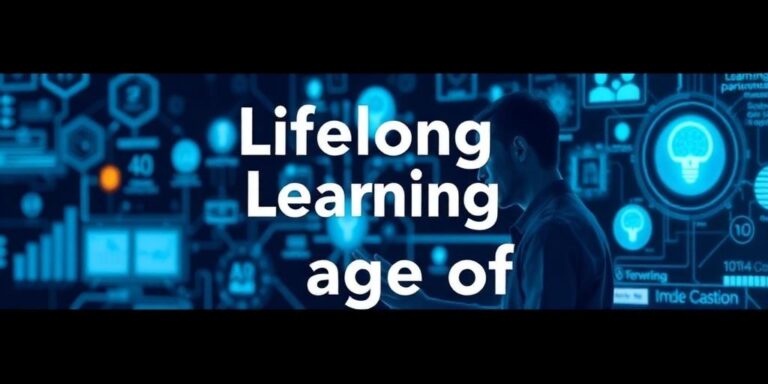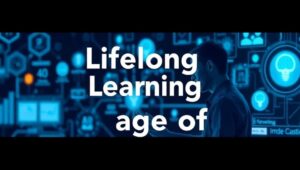Lifelong Learning in the Age of AI: Staying Relevant (2025+)
The rapid advancement of artificial intelligence (AI) is transforming industries and reshaping the job market at an unprecedented pace. To thrive in this evolving landscape, lifelong learning is no longer a luxury but a necessity. This article explores strategies for staying relevant and adapting to the age of AI.
The Shifting Landscape of Skills
AI is automating routine tasks, augmenting human capabilities, and creating entirely new roles. As a result, the skills demanded by employers are changing. Technical skills like AI development, data science, and cloud computing are in high demand. However, soft skills such as critical thinking, creativity, communication, and emotional intelligence are becoming increasingly valuable as they are difficult for AI to replicate.
Key Strategies for Lifelong Learning
- Identify In-Demand Skills: Research emerging trends and identify the skills that are most likely to be valuable in the future. Look at industry reports, job postings, and online resources to understand what employers are looking for.
- Embrace Online Learning: Online learning platforms offer a wealth of courses, tutorials, and certifications on a wide range of topics. Take advantage of these resources to acquire new skills and knowledge at your own pace.
- Focus on Foundational Skills: While it’s important to learn new technologies, it’s equally important to strengthen your foundational skills. A strong understanding of mathematics, logic, and critical thinking will make it easier to adapt to new technologies and solve complex problems.
- Develop a Growth Mindset: Embrace challenges and view failures as opportunities for learning. Cultivate a growth mindset by seeking out new experiences, experimenting with new approaches, and reflecting on your progress.
- Network and Collaborate: Connect with other learners, industry professionals, and mentors to share knowledge, exchange ideas, and build relationships. Networking can open doors to new opportunities and provide valuable support and guidance.
- Stay Curious: Cultivate a thirst for knowledge and a willingness to explore new topics. Read books, attend conferences, and participate in online communities to stay informed and engaged.
Practical Steps to Implement Lifelong Learning
- Set Clear Goals: Define what you want to achieve through lifelong learning. What skills do you want to acquire? What career goals do you want to pursue? Setting clear goals will help you stay focused and motivated.
- Create a Learning Plan: Develop a structured plan that outlines the resources you will use, the time you will dedicate to learning, and the milestones you will track. A well-defined plan will help you stay on track and make progress toward your goals.
- Allocate Time for Learning: Schedule time for learning in your daily or weekly routine. Treat learning as a priority and stick to your schedule as much as possible.
- Track Your Progress: Monitor your progress and celebrate your accomplishments. Tracking your progress will help you stay motivated and identify areas where you need to improve.
- Seek Feedback: Ask for feedback from mentors, peers, and instructors to identify areas where you can improve your learning approach.
The Future of Work and Lifelong Learning
As AI continues to advance, lifelong learning will become even more critical for staying relevant in the workforce. Individuals who are proactive about acquiring new skills and adapting to change will be best positioned to thrive in the age of AI. The future of work will require a mindset of continuous learning and adaptation.
Conclusion
Lifelong learning is essential for navigating the rapidly changing landscape of the age of AI. By identifying in-demand skills, embracing online learning, focusing on foundational skills, developing a growth mindset, networking, and staying curious, individuals can stay relevant and thrive in the future of work. The key is to be proactive, adaptable, and committed to continuous learning.




